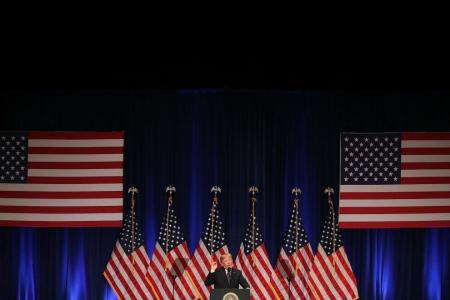Trump’s national security blueprint consistent with campaign rhetoric
National Security Strategy takes 'America First' approach to fight global concerns
United States President Donald Trump's first blueprint for national security is consistent with his campaign rhetoric.
The National Security Strategy (NSS) - which outlines the major security concerns of the US and how it plans to deal with them - announced on Monday paints the country as increasingly challenged by ambitious revisionist powers China and Russia, as well as rogue regimes Iran and North Korea.
It cites the threats of rampant immigration, radical Islamists, unfair trade deals and predatory foreign commercial interests undermining the US.
The response is a bellicose "America First" nationalism underpinned by a beefed-up and modernised military, a strong economy at home and hard-nosed mercantilism abroad, and a "great reawakening, a resurgence of confidence, and a rebirth of patriotism, prosperity, and pride".
Mr Trump's speech on the NSS was greeted with cheers from hawks such as Dr Sebastian Gorka.
"This NSS is founded on a mantra of 'America first' - not 'America alone' - under which the President and his White House reassert the Judeo-Christian values of the republic and the ties that bind us to those who share those values," he wrote in The Hill.
But critics have pounced on the dissonance between NSS rhetoric and reality - diplomatic heft has been eroded; and severe political polarisation at home undermines the US.
The 55-page document is, in true Trump fashion, characteristically blunt. China and Russia came in for mention as "revisionist" powers that sought to, in effect, take the game away from the US if it does not gear up and defend itself.
'BRUTALLY FRANK'
"Every other NSS has glossed over the level of strategic competition in the world and this one is brutally frank about the global competition," Dr Patrick Cronin from the Centre for a New American Security told The Straits Times.
Dr Ali Soufan, chief executive of The Soufan Group, told ST nobody would disagree with the broad goal of pursuing American power and prosperity.
But 60 per cent of senior State Department posts are still empty, he noted, adding: "If you want to accomplish engagement around the world to promote US interests or power, you need diplomacy."
Apart from China, Asia gets short shrift. Asean is mentioned just once - along with Apec.
Both will "remain centrepieces of the Indo-Pacific's regional architecture and platforms for promoting an order based on freedom", said the NSS.
"We will seek to increase quadrilateral cooperation with Japan, Australia and India. In South-east Asia, the Philippines and Thailand remain important allies and markets for Americans. Vietnam, Indonesia, Malaysia and Singapore are growing security and economic partners of the US."
Multilateral institutions also get only a perfunctory mention.
How the NSS will translate into policy will be better revealed as other policy papers, including the National Defence Strategy, are rolled out early next year.
"Every NSS has contradictions in the articulation of ends, ways, and means. This one is no different. The strategy will have to evolve," wrote Dr Michael Green from the Centre for Strategic and International Studies.
"Mr Trump's NSS is the first to start out anticipating the China challenge - an easier intellectual leap in the wake of (Chinese President) Xi Jinping's triumphalist 19th Party Congress to be sure - but one that will likely shape American strategic thinking for some time to come."
Get The New Paper on your phone with the free TNP app. Download from the Apple App Store or Google Play Store now



